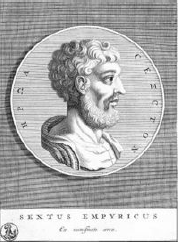Sextus Empiricus (2nd or 3rd Century CE), was a philosopher and medical doctor reported to have lived in Alexandria (now Egypt), Rome and Athens. He was a leading exponent of an ancient tradition of thinking called scepticism. Sextus was not so radical a sceptic as to deny the possibility of knowledge (as some sceptics did). He did, however, believe that all judgement should be suspended, thus allowing that any knowledge can subsequently be disproved. Sextus gets his nome de plume from his approach to medicine, which was based on the idea that a doctor should trust experience over medical theory—the ‘empiric’ school of medicine, from which word ‘empirical’ derives. Here Sextus describes his scepticism.

Scepticism is the ability to find the opposites both of objects of experience and of objects of thought in any way whatever. Because the opposed things or reasonings have equal force, we are led first to suspension of judgment, and then to serenity …
By objects of experience I mean things given to our senses, which is why I contrast them with objects of thought … [This] cover[s] all kinds of opposition: between one object of experience and another; between one object of thought and another; and between objects of experience and objects of thought … By opposed reasonings, I do not mean absolutely any assertion and its denial, but only conflicting reasonings.
By having equal force, I mean being equally probable and equally improbable, so that neither of two conflicting reasonings is more probable than the other.
Suspension of judgment is when the process of thinking comes to an end, without our denying or asserting anything …
Scepticism … [is] constituted on the principle that for every reasoning there is an equal and opposite reasoning; for we believe that this is the way to stop dogmatising … [G]iven that the dogmatist asserts the objective validity of what he is dogmatising about, and the sceptic utters his slogans as having self-limiting force, then the sceptic would not be said to be dogmatising when uttering them. And, most importantly, in uttering these slogans, he says what appears to himself and he reports his own feelings undogmatically, since he is making no claims about external objects.
Empiricus, Sextus. c.200. Outlines of Pyrrhonism. Bk 1:1, 1:4, 1:6, 1:7. || Amazon || WorldCat
